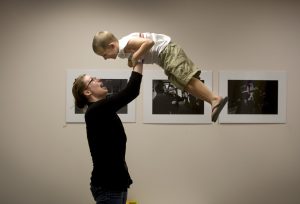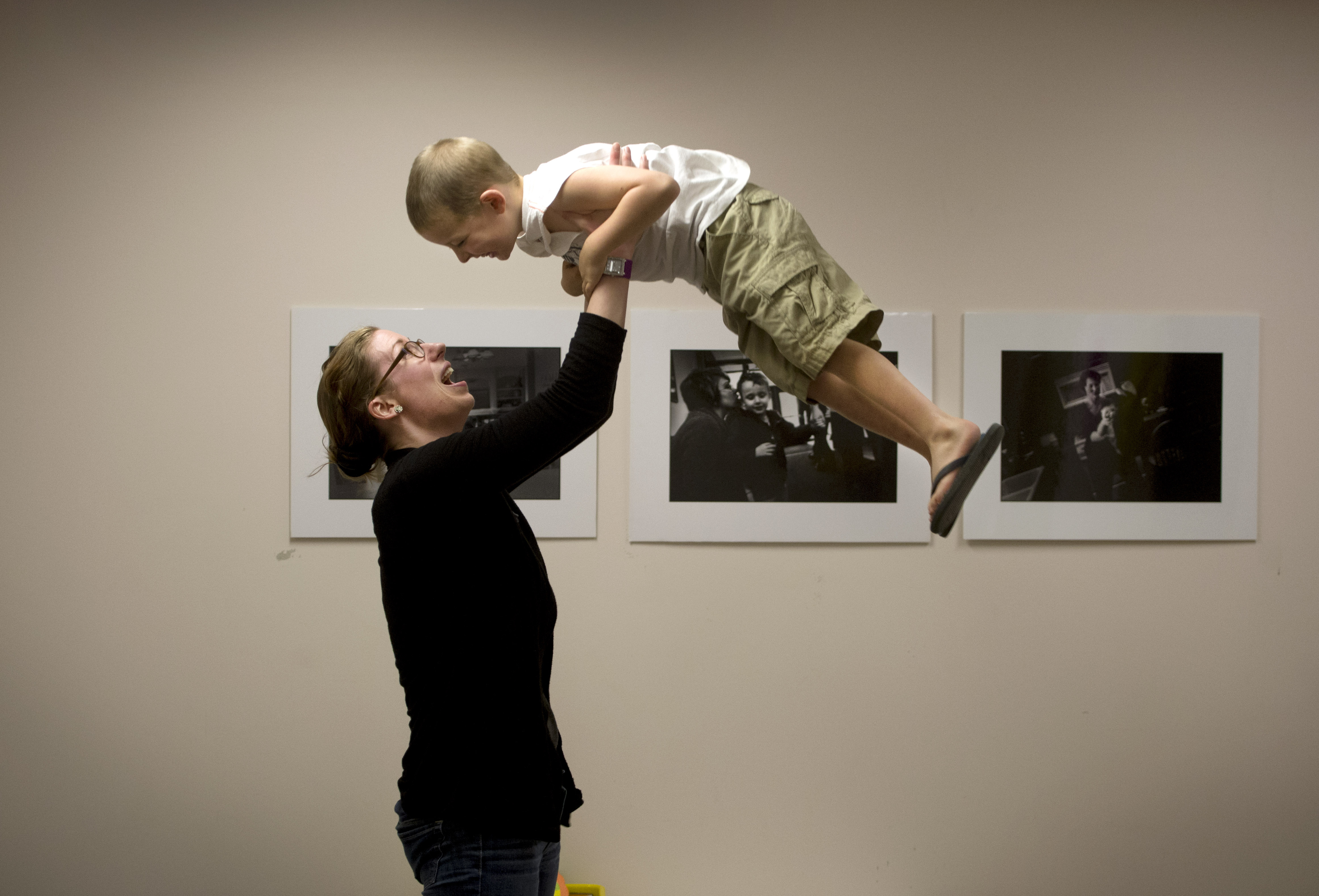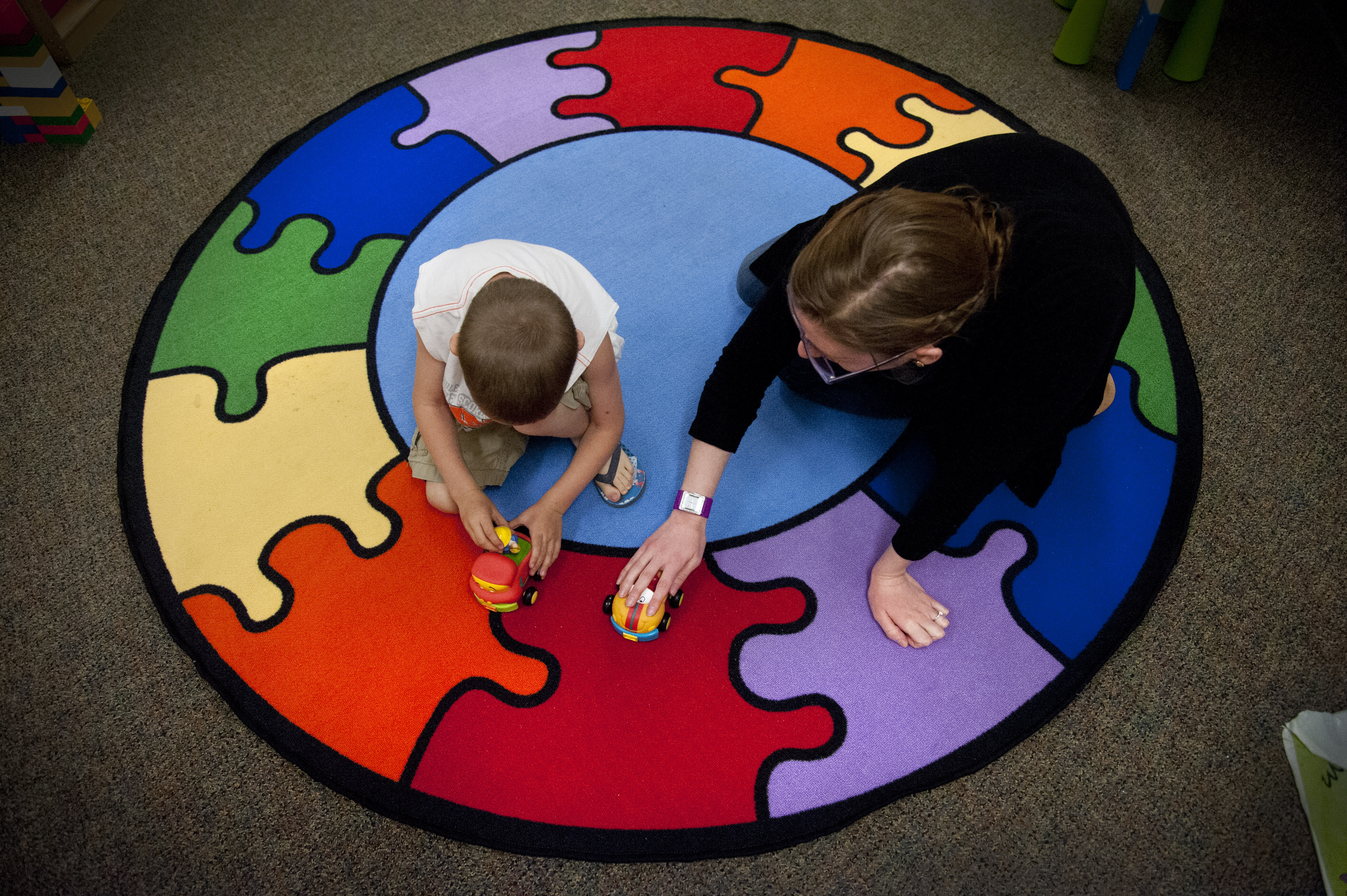###
Jessica Ley leaned close toward the 5-year-old sitting opposite her in a child-size chair, and she had his full attention.
“Spell ‘at,’ ” she said.
“A-T,” Darrin McCanna said, and it was cause for a mini-celebration.
“Bubbles or jumps?” Ley asked.
He chose jumps. “3-2-1, blastoff!” Ley said, and she hoisted him over her head as he laughed and covered his eyes with his hands.
(SR Photo: Dan Pelle)
Darrin, diagnosed with autism when he was almost 4, was in his third week of 12 weeks of intensive, one-on-one treatment at a new clinic at the Northwest Autism Center – one of just two of its kind in the state to open in response to a 2012 settlement allowing autistic children covered by Medicaid to receive “applied behavioral analysis,” or ABA, treatment.
Widely recognized as effective, ABA can help children with autism learn skills as varied as communication and toothbrushing. Making consistent use of positive reinforcement, it considers children’s environments as they relate to their behaviors. By changing the environment, therapists can change children’s behaviors.
Many insurers have balked at paying for ABA treatment, but more are doing so as a result of lawsuits. The Spokane clinic is based on a model created by the state Health Care Authority in response to the settlement.
The clinic, within the autism center on the lower level of St. Anne’s Children and Family Center at 25 W. Fifth Ave., hosted a pair of open houses last week along with presentations about ABA and insurance reform.
“Families need to know that things are changing,” said Dawn Sidell, the autism center’s executive director.
Legislators are more informed about autism and the need for coverage for treatment, she said. And “as the insurance coverage provides opportunities for organizations like mine to treat, it also provides opportunities for education and training, and it’s going to spill over.”
Treatment ‘boot camp’
Early intervention can be critical for children with autism.
The new clinic is for children ages 2 to 5 diagnosed in the past 12 months by an approved provider.
It’s designed to be the first place children go for treatment, Sidell said, providing an in-depth evaluation, an individualized treatment plan and help transitioning to day care or school.
(SR Photo: Dan Pelle)
“The core deficits around autism – the communication, the socialization, behavioral issues – those are the things that are going to be primarily addressed,” Sidell said.
Dana Stevens, the autism center’s clinical director, called the clinic an “ABA boot camp.”
“The families get trained on it. The kids get intensive services,” Stevens said. “We have a really good idea of who these kids are in assessments and what they need for intervention and different environments. This would be the jumpstart for them to go on to different treatments.”
Children receive 12 hours a week of mostly one-on-one treatment at the clinic; they sometimes meet in small groups to work on social skills. The clinic provides speech therapy when needed. Clinic staffers meet with the children’s next caregivers or teachers and help them develop a what’s-next plan.
Each treatment room has a window, allowing parents to watch, and parents get three hours a week of training and education about autism and ABA, including how to access services through school districts. Home visits help parents identify areas to work on with their children.
“This clinic is not only intensive for the child,” Sidell said. “It is for the whole family.”
Providers in training
While the clinic only serves children who qualify for Medicaid, Sidell said the clinic hopes to expand to accept children covered by private insurers.
One hurdle: finding enough qualified treatment providers.
“There’s a huge need in the community for those children to be served as well,” she said. “But we can only provide that service as quickly as we can identify qualified providers.”
Treatment is overseen by nationally certified ABA providers, who are in short supply.
But Sidell said she’s hopeful training at area universities will help boost their numbers in clinics as well as at schools, day cares, and psychology and social work offices.
Ley, the therapy assistant who worked with Darrin McKenna last week, is a graduate student at Gonzaga University, where a master’s program prepares students to take the exam to be a board-certified behavior analyst.
Whitworth University has a proposed graduate-level program under review by the National Behavior Analyst Certification Board. The program could be running by next fall and would initially probably admit 10 to 15 students seeking to become certified ABA providers, special-education professor Flint Simonsen wrote in an email.
And WSU Spokane’s health sciences campus “is eager to explore partnerships” with the autism center, spokeswoman Terren Roloff said, and hopes to create clinical opportunities for students to learn about autism treatment.
‘My son had a voice’
Tara McCanna, Darrin’s mother, said the clinic already has helped him. By the end of his first day, she said, he could count by fives to 20 – on his way to 100, a previously set goal he hadn’t been able to progress toward before. Now he can button a shirt.
She attributed his successes to the clinic’s one-on-one approach.
Before he worked on spelling words during his session last week, Darrin worked a shoelace. Later, he built with blocks.
(SR Photo: Dan Pelle)
Throughout the session, Ley offered small rewards tailored to Darrin’s preferences as she led him through exercises tailored to his needs. The spelling work was designed to improve Darrin’s skills, but also to help him practice responding on demand to verbal prompts for school.
While the clinic is designed mostly to be a first stop for families of autistic children, Darrin already had received ABA treatment through the Domino Project, the autism center’s early education program.
The results were striking, McCanna said.
“He didn’t talk, and then he talked,” she said. “I mean, my son had a voice. From not speaking to speaking, that really was amazing.”
• To learn more about the 12-week clinic, contact the Northwest Autism Center at (509) 328-1582 or email [email protected].





